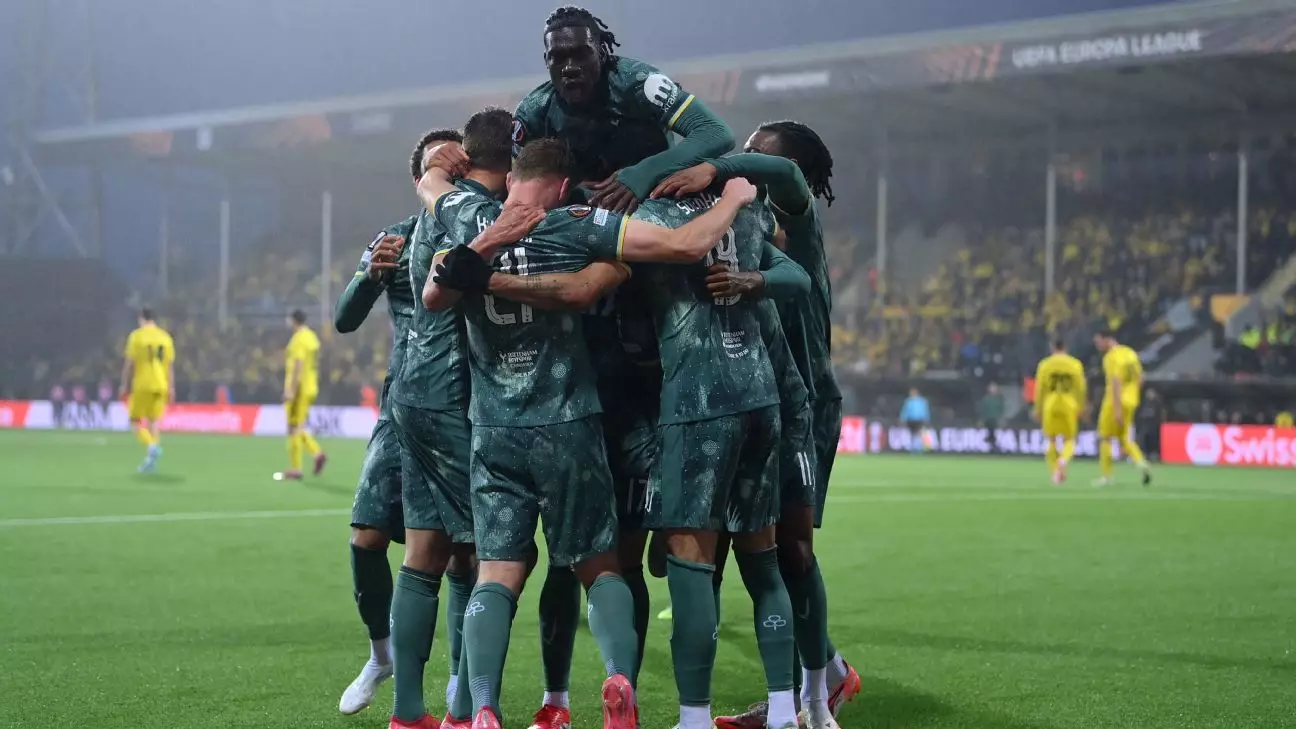When Ange Postecoglou took the reins at Tottenham Hotspur, he was acutely aware of the ominous shadow cast by the “Spursy” label. This term, synonymous with dramatic failures and missed opportunities, has followed the club for years like a persistent ghost. Yet, Postecoglou’s mission was clear: to expel this enduring stigma and usher in a new era characterized by resilience and success. Now, with Spurs reaching the UEFA Europa League final, one must ask: has he finally begun to erase this painful moniker?
Despite lingering pitfalls that have seen Tottenham languishing in the Premier League, Postecoglou’s approach significantly alters the narratives surrounding the North London club. Under his guidance, Spurs overcame a formidable Bodø/Glimt side in a way that contradicts their historically fraught reputation. By executing a tactical game plan that exemplified both discipline and patience—traits often eschewed in high-profile matchups—Postecoglou has blotted out excuses and provided proof that this is a different Tottenham.
Mastering the Narrative
In an era where football narratives are shaped by social media soundbites and tabloid headlines, Postecoglou remains unwavering in the face of criticism. By dismissing the league standings as irrelevant identifiers of success, he is rewriting the conversation surrounding Tottenham’s achievements. His assertion that winning a trophy is paramount—irrespective of a mediocre league campaign—challenges the norms of football discourse where silverware often serves as the only valid currency of success.
Critics will point to Tottenham’s current position within the Premier League—a distressing 16th place—but one thing rings true: the Europa League’s final berth signifies growth. Such a juxtaposition of league plight and potential European triumph not only illustrates the unpredictability of football but also underscores the fine line that Postecoglou treads between success and scrutiny.
In the face of adversity, the coach’s stoicism and refusal to be pigeonholed showcases deep leadership qualities. Spurs’ journey towards the final reflects a steely resolve, evidenced by their defeats against Napoli, thought to be unassailable, and persistent spirit resounding from the players who have rallied under Postecoglou’s management. He’s not merely a coach but a change agent, positioning his team to challenge their narrative.
Defensive Fortitude: A Notable Shift
Traditionally associated with high-octane attacking football, Postecoglou’s current tactical set-up has more to do with pragmatism than flamboyance. He’s traded reckless abandon for a more calculated approach, demonstrating that Tottenham can maintain defensive solidity while executing precise offensive transitions. Their performance against Bodø/Glimt—a team with an impressive home record—illustrated this strategic maturation.
In the buildup to their second-leg match, Spurs deployed a clever strategy that sought to nullify the attacking threats posed by the hosts. While their first-half play may have appeared conservative and unassuming, the decision was not to cower but to avoid needless risks. Their defense emerged unscathed, ultimately laying the foundation for a clean sheet—an achievement worth noting given Bodø/Glimt’s formidable scoring record at home.
Postecoglou’s navigation through critical knockout stages has reaffirmed that encounters in Europe are, indeed, a different beast compared to domestic fixtures. When the stakes are highest, players have risen to the occasion, emphasizing the coach’s ability to inspire performances through the pressures of elite competition.
Building Towards Redemption
If there is a silver lining to the club’s current turmoil, it is that Postecoglou has successfully instilled a renewed sense of hope among fans—a sentiment that has been painfully elusive in recent years. His belief in the team’s potential to lift a trophy for the first time in 17 years resonates deeply with supporters, who have been yearning for tangible success. The juxtaposition of league struggles against continental advancement creates a narrative ripe for redemption.
Moreover, the psychological burden of the “Spursy” tag continues to be a focus of elimination. Postecoglou’s insistence on aiming for success, regardless of the setbacks faced in the league, reinforces a vision dedicated to aspiration rather than anxiety. He has opened the door to a rejuvenation of pride in supporters, allowing themselves to dream of a cup, a trophy, a moment—something beyond the pain of past disappointments.
The Europa League final presents not just an opportunity for glory, but a chance for Tottenham to shatter preconceived notions entrenched within the footballing community. In achieving this, Postecoglou stands at the precipice of not only altering his own legacy but also reshaping that of an entire club; ushering in a future where “Spursy” is but a distant memory. The potential for growth lies bright, and the collective sentiments of belief reaffirm that hope for trophies can be reignited.

